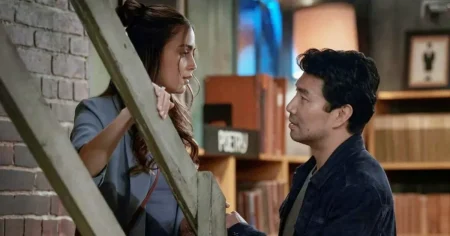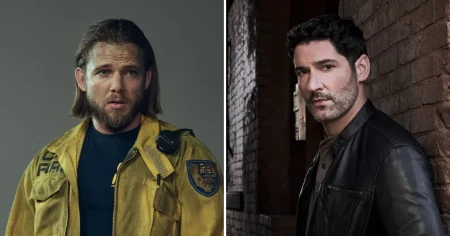American Beauty: A Reflection on the Film’s Legacy and Its Cast Today
In the landscape of late 1990s cinema, “American Beauty” emerged as a cultural phenomenon that captivated both critics and audiences alike. Sam Mendes’ directorial debut—a darkly comic exploration of suburban malaise and midlife crisis—became one of 1999’s most unexpected triumphs. The film’s unflinching look at the disintegration of the Burnham family resonated deeply with viewers, generating over $350 million at the global box office and sweeping the 2000 Academy Awards with five Oscar wins, including Best Picture, Best Director for Mendes, and Best Actor for Kevin Spacey. What made “American Beauty” so compelling was its ability to balance biting satire with genuine human emotion, creating a story that felt both uncomfortably familiar and hauntingly beautiful.
At the center of the film’s success was Kevin Spacey’s transformative performance as Lester Burnham, a man who rejects his mundane existence after developing an inappropriate infatuation with his daughter’s friend. The role marked a significant turning point in Spacey’s career, elevating him from respected character actor to leading man status. His portrayal of Lester—by turns pathetic, hilarious, and ultimately sympathetic—captured the film’s complex tone perfectly. Alongside Spacey, Annette Bening delivered an equally nuanced performance as Carolyn Burnham, Lester’s status-obsessed wife whose brittle exterior masks profound desperation. Together, they created one of cinema’s most memorable dysfunctional couples, their disintegrating marriage serving as the emotional centerpiece of the film’s exploration of American dissatisfaction.
The younger cast members of “American Beauty” also left indelible impressions, with many launching significant careers from their roles in the film. Thora Birch brought remarkable depth to the character of Jane Burnham, the alienated daughter caught between contempt for her parents and her own search for identity. Wes Bentley’s portrayal of Ricky Fitts—the voyeuristic neighbor who sees beauty in unexpected places—introduced audiences to his intense, brooding screen presence. Mena Suvari’s Angela Hayes, the object of Lester’s inappropriate desire, demonstrated the actress’s ability to convey both calculated seduction and teenage vulnerability. Supporting players like Chris Cooper and Allison Janney as the deeply troubled Fitts family rounded out the exceptional ensemble that made the film’s suburban setting feel authentic and lived-in.
Beyond its performances, “American Beauty” captivated audiences with its striking visual style and thematic depth. Cinematographer Conrad L. Hall’s Academy Award-winning work—particularly the iconic image of Suvari bathing in rose petals—created a dreamlike quality that enhanced the film’s exploration of fantasy versus reality. Alan Ball’s Oscar-winning screenplay deftly balanced dark comedy with profound observations about American values, consumerism, and the search for meaning. Thomas Newman’s haunting score provided the perfect atmospheric accompaniment to the film’s blend of satire and melancholy. These technical elements combined to create a film that felt both of its moment and timeless—a snapshot of millennial America that also spoke to universal human experiences of dissatisfaction, desire, and the search for beauty in unexpected places.
However, the legacy of “American Beauty” has become increasingly complicated in recent years, particularly following the serious allegations of sexual misconduct against Kevin Spacey that emerged in 2017. These accusations inevitably cast a shadow over the film, whose themes of inappropriate desire and predatory behavior now read differently to many viewers. The fact that Spacey’s performance as Lester—a character who lusts after a teenage girl—was so central to the film’s success makes this reconsideration particularly challenging. While Spacey has consistently denied wrongdoing and was ultimately acquitted in a UK criminal trial and found not liable in a US civil case, the allegations have unavoidably altered how many audiences experience the film. This evolution in reception demonstrates how cultural contexts shift over time, changing our relationship with even the most acclaimed works of art.
Despite these complications, “American Beauty” remains a significant film that captures a particular moment in American culture at the turn of the millennium. Its exploration of suburban malaise, false appearances, and the search for authentic beauty continues to resonate with viewers willing to engage with its complex themes. The film’s young cast members have continued their careers with varying degrees of success—some, like Wes Bentley, experiencing career revivals after periods of struggle, while others have moved between Hollywood productions and independent projects. Director Sam Mendes went on to build an impressive filmography that includes “Road to Perdition,” “Revolutionary Road,” and the James Bond films “Skyfall” and “Spectre.” As “American Beauty” approaches its twenty-fifth anniversary, it stands as a fascinating time capsule—a film that both defined its era and continues to provoke discussion about art, morality, and how we navigate the complicated legacies of creative works in light of their creators’ alleged misconduct.














